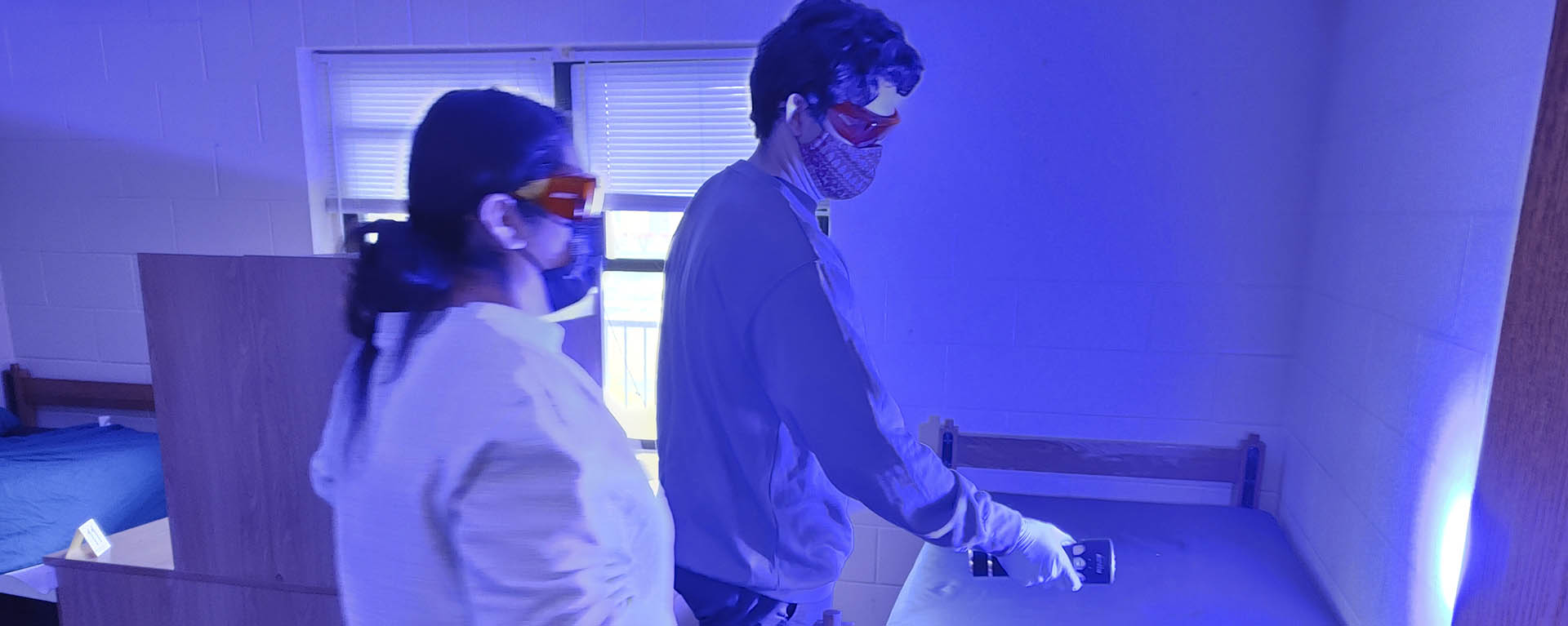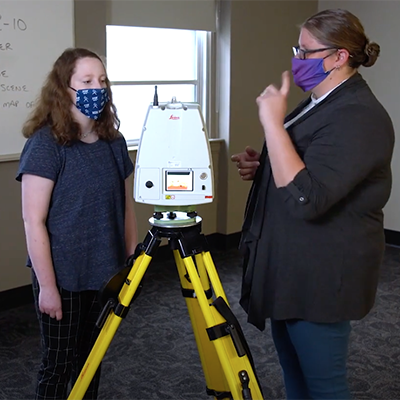
Preparing you to succeed in the criminal justice or legal studies professions
Whether you're interested in a career in law enforcement, corrections, security administration, forensic investigation or legal studies, Washburn University's Criminal Justice & Legal Studies department will prepare you to succeed. While working with faculty who have real world experience, you'll learn the necessary theoretical, practical and critical thinking skills to compete in today's job market.
A criminal justice or legal studies degree prepares you for careers such as:
- Paralegal or Legal Assistant
- Patrol Officer/Sheriff's Deputy
- Special Agent
- Detective
- Corrections Officer
- Parole or Probation Officer
- Private Investigator
- U.S Marshal
- Crime Scene Investigator
- Fingerprint Examiner
- Firearms Examiner
- Fire Investigator
Which criminal justice or legal studies degree is right for you?
This degree is a stand-alone degree that is offered as a way for students to get credit for taking any variety of CJ courses. For example, if a student has an interest in law enforcement(LE) and forensic investigation(FI), then the general BCJ would likely be the better option so that the student could take both LE and FI courses which would both count toward their degree credits.
Do you have an interest in working in the corrections field? This degree pathway focuses on theories, evidence-based practice, and current issues facing the corrections field. Students can enroll in elective courses that are specific to the corrections pathway.
After graduation you'll be well prepared for jobs at local, state, federal, and private correctional facilities, probation offices, parole offices, halfway houses, residential treatment centers, and adult or juvenile programs. Some of the job opportunities may include:
- Corrections officer
- Corrections counselor
- Corrections manager or supervisor
- Parole officer
- Juvenile detention or corrections officer
- Case manager
- Probation officer
- Probation supervisor
- Reentry services
- EAI (Enforcement, Apprehension, and Investigation unit)
- Victim services
- Residential counselor
- Child protection specialist
- Transport officer
After graduation you will be well prepared for jobs at local, state, federal, and private security and law enforcement agencies. Some of the job opportunities may include:
- Patrol Officer
- Detective
- Special Agent
- Private Investigator
You'll have the opportunity to choose classes that focus more on the role of law enforcement in the community along with skills needed to be successful at any law enforcement academy.
Students who choose the Law Enforcement emphasis can find work at the local, county, state, and federal levels. These roles are considered certified law enforcement officers that require the completion of any state's academy training.
This program is designed to prepare you for professional and managerial employment in security, investigations, loss prevention and risk management positions in business, industry, government agencies and non-profit organizations. This program is designed for both personnel already employed in criminal justice and pre-service students interested in careers in security.
Jobs you'll be prepared for include:
- Private investigator
- Security officer
- Special agent
- Transportation security
- Retail/asset protection
This emphasis has two different degree pathways that the you can choose from:
- Forensic Investigation (FI)
- Forensic Investigative Sciences (FIS)
Students who are interested in Forensic Investigation have a passion for science and truth! You can hope to gain a career in the following job titles:
- Crime scene investigator
- Death investigator
- Evidence technician
- Forensic examiner
This degree prepares you to work in the judicial court system. Students can gain careers in the following areas:
- Paralegal
- Legal Assistant
The degree also prepares you to continue your journey into law school or other advanced degrees.
Faculty and staff in the legal studies program are former practitioners who offer real-world experience in the classroom. Students will learn many facets of the judicial system that will prepare them for their career in law.
The Associate of Arts in Legal Studies can be achieved in two years.
The legal training and skills you gain can lead to success as a paralegal or may even serve as a springboard for earning a bachelor's degree or attending law school.
- Associates degree in Criminal JusticeAssociates degree in Criminal Justice
- Associate of Arts in Legal StudiesAssociate of Arts in Legal Studies
The Master of Criminal Justice (MCJ) degree is designed to meet the needs of criminal justice professionals and pre-professionals who desire to enhance their knowledge, skills, and talent in criminal justice administration.
The degree program is dedicated to informing professional best practices, advancing scholarship, and promoting responsible leadership through various courses in law enforcement, corrections, and security administration.
Students can:
- Add a Communication & Leadership graduate certificate to their MCJ studies.
- Enroll in a dual-degree in MCJ and JD.
- Participate in a fast-track Bachelors-to-MCJ degree program as an undergraduate.
Other program offerings
You can also add a legal studies certificate or criminal justice minor to any major.
Meet student success story Emma Morrissey
Sophomore Emma Morrissey learned about Washburn from one of her high school teachers in Overland Park. She fell in love with campus and the Criminal Justice program, now her major. Emma is president of the Criminal Justice Association on campus and plans to attend law school after she receives her undergraduate degree.
Meet your instructors
The Washburn University Criminal Justice and Legal Studies Department is made up of faculty and staff who have worked in the field and have experienced the career first-hand! We are dedicated to helping students find the right pathway for them as well as encouraging them to find out more information, seek out student-based clubs, and always ask questions!
Frequently asked questions
We frequently answer similar questions from prospective students, so we've compiled some answers to the most frequently asked ones!
A jurisdiction is an area in which a law enforcement officer or law enforcement agency has authority over in terms of effecting arrests, performing traffic stops, and investigating crimes.
- Local/County-level agencies: these agencies perform most of the patrol function for an area. The Topeka Police Department would be a local-level agency, while the Shawnee County Sheriff's Office would be a county-level agency. Each has similar and different roles depending on the agency.
- State-level agencies: these agencies have jurisdiction over the state and perform various criminal and patrol functions. Highway patrol or state police perform patrol functions, while special agents perform more detective-like functions.
- Federal-level agencies: these agencies have jurisdiction over the entire country. Most federal-level agencies do not perform any kind of patrol function but work more on handling crimes that have covered many states, fugitives that have crossed state lines, and mass disasters.
The role of a detective is achieved through promotion in a law enforcement agency. For most local agencies, the pathway to detective looks like:
- Get hired by a law enforcement agency - usually local or county-level.
- Attend the academy - some agencies will pay for you to attend after you get hired. Some states/agencies require you to attend and pass the academy before applying for a law enforcement position (the cost of academy training would be yours).
- Complete probation and field training phases - these phases usually take a year to complete and be proficient as a patrol officer.
- Work as a patrol officer—the amount of time will depend on the agency and the number of available detective positions within the department.
- Apply for a detective position when one is available.
Special agents generally embody similar functions at the state and federal levels as detectives at the local and county levels.
To be a detective for a local/county jurisdiction, you must become a patrol officer. Most detective and special agent roles require candidates to successfully pass some academy training so that the individual is prepared for weapons handling and safety, maneuvering emergency vehicles, understanding state/local/federal criminal law, and making arrests.
For the majority of local/county agencies, the answer is: NO! However, the majority of crime scene investigation jobs available in Kansas still require applicants to have previously been a patrol officer OR have completed the academy training. Outside of Kansas, many local/county agencies nationwide DO NOT require the applicant to have previously been a patrol officer or completed any academy training.
The answer is sometimes.
Firstly, you will have to get hired by the FBI, which entails a fitness test, polygraph exam, thorough background investigation, and completion of the FBI academy. Then, you would serve as a special agent. Participation in a crime scene response team (CRT) would depend on whether the regional location had an opening on the team.
The FBI has special agents who comprise regional crime scene response teams (CRT). The teams consist of about five special agents who have had specialized crime scene training. Crime scene response at the federal level is considered an auxiliary duty and is not a full-time job.
The CRT is called in for mass casualty events, active shooter events, and other large or multi-jurisdictional crime scenes. Since most crime scene investigations can be handled at the local, county, or state level, most FBI special agents do not work many crime scenes yearly.
Declare
Student orgs.
GET IN TOUCH WITH Criminal Justice & Legal Studies
Criminal Justice & Legal Studies
School of Applied Studies, Room 301
1700 SW College Ave.
Topeka, KS 66621
Phone & Email
785.670.1411
criminal-justice-ls@washburn.edu



